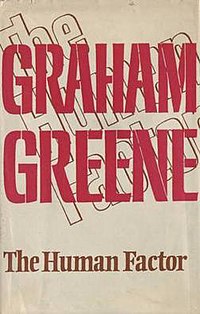The Human Factor
by Graham Greene
Maurice Castle is an aging bureaucrat in the British secret service MI6. Married to a black African woman with whom he fell in love during his previous stint in apartheid South Africa, he now lives a quiet life in the suburbs and looks forward to retirement. As the book begins, a leak has been traced to the African section in London where he works and threatens to disrupt this precarious tranquility. Castle and younger colleague Davis make light of the resulting inquiry, but when Davis is accused on circumstantial evidence and quietly "disposed of", Castle begins to wrestle with questions of loyalty, morality and conscience. On the one hand, Castle undertakes his day-to-day job professionally, and is willing to do what is more than required for both Davis and Daintry, his boss. On the other hand, Castle is grateful to Carson, who, as a Communist, helped Castle's wife escape South Africa. In return, Castle decides to help the Communists and believes that by helping them, he is helping his wife's people—not knowing that Moscow has all along been using him for entirely different purposes.
The novel ends with a bleak portrayal of life in Moscow for defectors who were feted but at the same time suffered the shortages, shoddy furnishings and underwhelming work shared by Soviets. The disappointment is sharp for Castle, who never had an investment in Communism and whose actions severed him from the two people he loved.
The novel builds its suspense by focusing on the psychological burdens of the pawns in the game, particularly frustration with the culture of secrecy in the three secret services—British, Soviet and South African—and with the sophisticated amorality of the men at the top. Greene's characters are complete psychological portraits located within the context of the Cold War and the impact of international affairs on the complicated lives of individuals and vice versa. The interplay of international politics and personal dissent is a trademark of this author.
